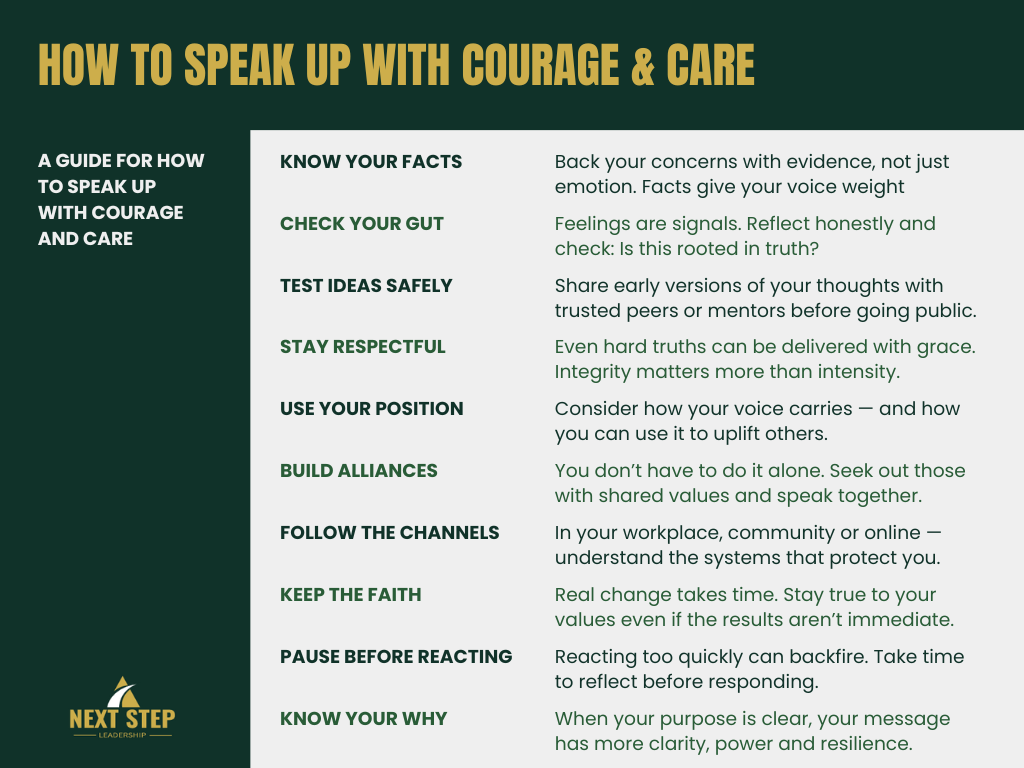How to Speak Up With Courage (and Care)
Sometimes, it feels like we’re living in an upside-down world.
Poor behaviour is rewarded. Well-meaning people are persecuted. Inequities are ignored. Great leadership goes unappreciated while poor leadership is praised — celebrated, even. In this climate, speaking the truth can feel risky. It can ruffle feathers, create discomfort or get shut down altogether.
But here’s what I’ve come to learn: Silence protects the system, not the people.
I’ve written before about why I dislike the idea of “faking it till you make it.” I also reject the notion that we need to “toe the line” or keep quiet if we want to get ahead. You might get ahead that way — but it’s worth asking: Ahead to where? And at what cost?
Is staying silent worth sacrificing a part of yourself? Is people-pleasing worth your integrity?
Real-world injustice, up close and afar
As I write this, I’m reclining in a chair while donating plasma. The majority of the nurses tending to me — skilled, attentive and kind — are women. And yet, despite a lot of hard work from many in recent years, the pay inequities in this very profession remain. To make matters worse, New Zealand recently passed legislation making it harder for pay equity claims to be raised. In a country that prides itself on fairness and equality, this sends a chilling message.
And we’re seeing similar inequities and double standards around the world — where voices of truth are silenced, where war crimes are downplayed or ignored, where those standing for justice are vilified. It’s easy to feel disheartened.
But history reminds us that silence is not neutrality.
It is complicity.
Truth-telling isn’t always polite — but it is powerful
You’ve heard the saying: one person’s terrorist is another person’s freedom fighter.
One of the most prominent examples is Nelson Mandela — a man once imprisoned and labelled a terrorist by some, now remembered as one of the greatest leaders of our time. His refusal to remain silent in the face of injustice helped shape a democratic South Africa.
Was he always comfortable? No.
Was he always praised? Definitely not.
But he chose alignment over approval. Truth over silence. And his leadership endures because of it.
It’s not always grand gestures that define courageous leadership. Often, it’s in the daily decisions to stay aligned with our values, even when it’s unpopular or inconvenient.
Free and frank (and courageous)
Here in New Zealand, the Public Service has long been recognised for its commitment to political neutrality and free and frank advice. These aren’t just buzzwords — they’re foundational principles that ensure public servants provide evidence-based advice, even when that advice is unpopular with those in power.
And yet, it takes courage to live those values in real time.
We’ve seen officials publicly criticised for decisions made by politicians — decisions that may have ignored or overruled the very advice those officials gave. And still, many of those public servants show up the next day, ready to offer sound, principled guidance again.
That’s what leadership looks like.
In these times, I find myself asking:
What am I staying quiet about just to keep the peace?
What might shift if I spoke up — with clarity, with courage and with care?
And, what is the right way to speak up?
So, what is the right way to speak up?
Speaking up doesn’t have to mean shouting the loudest or storming the barricades. It can be thoughtful, principled and strategic. Here’s a guide for how to do it well:
Know the facts. Back your concerns with evidence, not just emotion. Facts give your voice weight.
Trust your gut — but test it. Feelings are signals. Reflect honestly and check: Is this rooted in truth?
Find safe spaces to test your thinking. Share early versions of your thoughts with trusted peers or mentors before going public.
Speak with respect and dignity. Even hard truths can be delivered with grace. Integrity matters more than intensity.
Be aware of your position and privilege. Consider how your voice carries — and how you can use it to uplift others.
Build alliances. You don’t have to do it alone. Seek out those with shared values and speak together.
Know the formal channels. Whether in your workplace, community or online — understand the systems that protect you and give your message legs.
Keep the faith. Real change takes time. Stay true to your values even if the results aren’t immediate.
Pause, don’t pounce. Reacting too quickly can backfire. Take time to reflect before responding.
Know your why. When your purpose is clear, your message has more clarity, power and resilience.
We may not be able to fix the upside-down world overnight. But we can speak up, in our own way, in our own spaces, with our own voices.
And when we do, we create ripples of change — ripples that encourage others to speak up too. Remember, it takes one pebble to start an avalanche. Your next step, your voice could be that pebble.
At Next Step Leadership, we work with those who are ready to align their actions with their values — even when it’s uncomfortable. If you’re ready to find your voice or use it more effectively, let’s talk.

